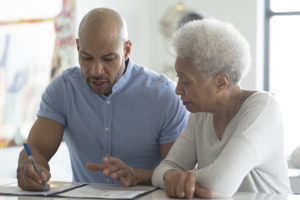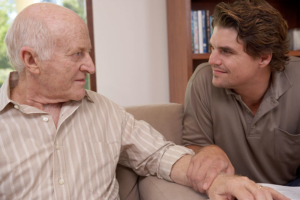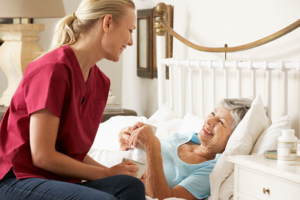Are You Experiencing a Lack of Caregiver Appreciation?

Lack of caregiver appreciation can lead to burnout or depression.
As soon as you woke up this morning up until the end of an exhausting day, you have given your all to your older family member. You provided assistance with showering and dressing, prepared nutritious meals, cleaned the house, all while making certain a senior loved one was happily involved in enjoyable activities, made it to their 2:00 hair appointment, and picked up groceries and prescriptions afterwards. And while you are not doing any of these things for a pat on the back, a simple “thank you” would be nice – but is almost never offered as a sign of caregiver appreciation.
If you are feeling a lack of caregiver appreciation or completely unappreciated altogether, you’re not alone. This is a frequent occurrence in caregiving for a number of reasons, and if not addressed, can cause caregiver burnout or depression. These strategies can help.
- Learn the skill of self-appreciation. The work you are doing is extremely important, and you deserve to be rewarded for it. Choose something each week that you’re going to do for yourself for a job well done. It could be as simple as one hour spent reading on the porch swing or a dessert from your favorite bakery. You can also plan for larger rewards, such as a long weekend getaway, by engaging respite care services from a dependable care partner like Responsive Home Care.
- Try to understand their perspective. There are a number of reasons a senior may not be expressing gratitude for the work you are doing. Someone with dementia or another chronic condition could be fully focused on their own struggles or the day-to-day tasks close at hand which are typically now more challenging. Putting yourself in the other person’s shoes can help you accept that a lack of verbal appreciation doesn’t automatically equate to true ungratefulness.
- Start modeling appreciative behavior. Let the senior see by example how good it feels to be appreciated by genuinely thanking them whenever the ability arises, no matter how small. If they fold and hang up the towel after their shower, clean off the table after lunch, or help with putting away groceries – be sure to thank them.
By providing home health care in Fort Lauderdale, FL and surrounding areas, we are always here to share in your caregiving duties, to alleviate stress and allow you plenty of time for self-care. Regularly scheduled time away is essential, and we’re here for as much or as little as you will need. While you’re taking care of yourself, we will help a senior you love with:
- Companionship for conversations, games, puzzles, hobbies, exercise, etc.
- Laundry and housekeeping
- Meals
- Medication reminders
- Personal care (showers, baths, getting dressed, etc.)
- Transportation to fun outings or appointments
- And much more, according to each person’s unique needs
Reach out to Responsive Home Care for a complimentary in-home consultation and let us know exactly how we can help.





 It began with those in your inner circle, and it has gradually been spreading outward to friends and acquaintances. Discussing a COPD diagnosis and knowing how to reply to the various questions that arise about it could be uncomfortable – for you personally, and for those you are speaking with as well.
It began with those in your inner circle, and it has gradually been spreading outward to friends and acquaintances. Discussing a COPD diagnosis and knowing how to reply to the various questions that arise about it could be uncomfortable – for you personally, and for those you are speaking with as well.
 It may have been suspected, or maybe broadsided you out of nowhere. Mom has just received the official diagnosis for a progressive disease that’s going to make independent life a challenge. While there are lots of unknowns, one thing is for sure: she is insistent about remaining at home – meaning you may need to learn how to be a supportive family caregiver.
It may have been suspected, or maybe broadsided you out of nowhere. Mom has just received the official diagnosis for a progressive disease that’s going to make independent life a challenge. While there are lots of unknowns, one thing is for sure: she is insistent about remaining at home – meaning you may need to learn how to be a supportive family caregiver. If you knew that a significantly better quality of life could be achieved for someone you care about, you wouldn’t hesitate to explore that option. Yet one of the most beneficial types of care – hospice care – is one that family members shy away from, because of many different hospice misconceptions.
If you knew that a significantly better quality of life could be achieved for someone you care about, you wouldn’t hesitate to explore that option. Yet one of the most beneficial types of care – hospice care – is one that family members shy away from, because of many different hospice misconceptions. If it feels like a senior with
If it feels like a senior with  If someone were providing
If someone were providing  Life, especially but not just during the pandemic, can be filled with uncertainty. For seniors who are feeling less in command of particular facets of life, such as losing physical or cognitive functioning, concentrating on what can be controlled is empowering.
Life, especially but not just during the pandemic, can be filled with uncertainty. For seniors who are feeling less in command of particular facets of life, such as losing physical or cognitive functioning, concentrating on what can be controlled is empowering.